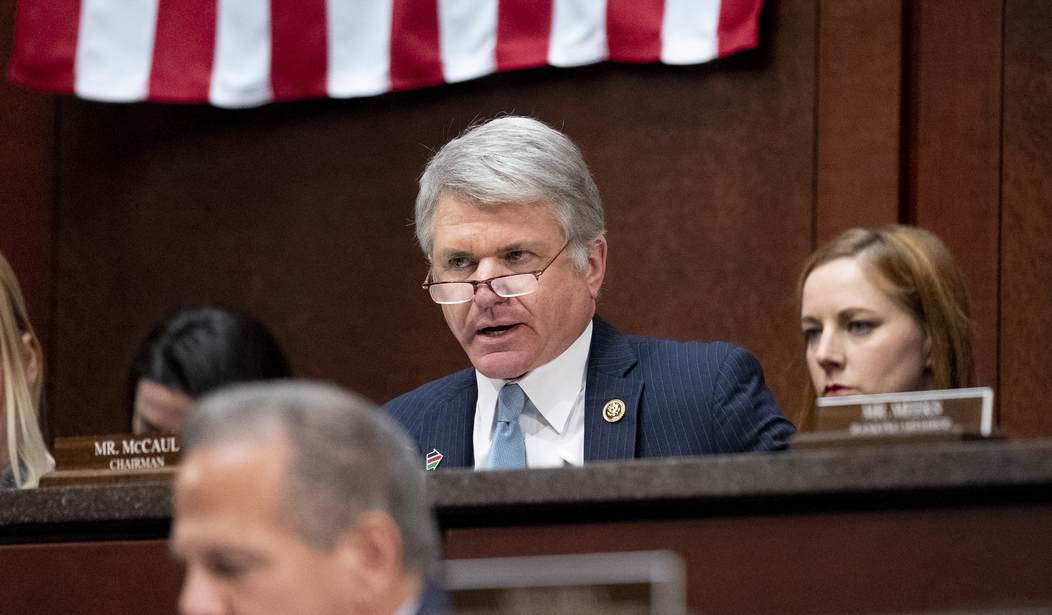The chairman of the House Foreign Affairs Committee opined Friday that, ultimately, Speaker Mike Johnson will have to allow a vote on military aid to Ukraine, Israel, and Taiwan despite the opposition of a small number of GOP Representatives who insist on a border security package as a prerequisite to such a vote while steadfastly refusing to offer a border security bill or amend the bill produced by the Senate.
Texas Republican Michael McCaul said Speaker Johnson was committed to moving the Senate aid package.“I think that’s going to be a difficult choice for him," he said, "because if they’re threatening a motion to vacate, it’s a tough decision.” As a side note, that threat is really a non-threat. Kevin McCarthy made a deal with the devil to become House Speaker by permitting a rule that enabled a single representative to force a vote on a motion to vacate the chair. Since Matt Gaetz forced McCarthy out, the rule has reverted to only allowing a motion to vacate to be introduced, if "offered on behalf of a party conference or caucus." So Johnson is in no danger of such a vote being introduced, and Hakeem Jeffries has pledged his caucus will vote to support Johnson if it happens.
“I don’t see anyway of getting out of Israel, Indo Pacific and eventually Ukraine coming to the floor. He’s either going to have to do it — put it on the floor himself — or it’s going to be by virtue of a discharge petition, which is a complete evisceration of his power, because it basically says we’re going to do this without the Speaker being in charge,” the chairman continued.
Indeed, a discharge petition would make Johnson a lame-duck Speaker. Making such a petition successful would only take about 10 GOP votes.
House Minority Leader Hakeem Jeffries has vowed to use “all options” to break the logjam, including a discharge petition, which would require a majority of House members to sign on.https://t.co/02PD0hSs5K
— POLITICO (@politico) February 16, 2024
As about 30 GOP House members won in Biden-majority districts, that number would not be hard to garner.
“There are some [House Republicans] that I don’t think can be persuaded, because the narrative is so strong. I think the sort-of brainwashing, if you will, that we have to choose between our southern border and Ukraine, has been out there. I don’t agree with that,” McCaul said.
“I think it’s a false dichotomy. We’re a great nation, and we can do both. I live in Texas. But I think we have to explain to the American people why Ukraine is a national security interest; it directly impacts China and has an impact with Iran and our adversaries.”
“Given Johnson’s opposition, supporters of Ukraine aid face an uphill battle to bring the Senate bill to the House floor. Options include a rarely invoked discharge petition. ‘The quicker option…is defeating a previous question,’ reports Punchbowl News”https://t.co/teKlKVMaQN
— @pamaqua2017 🇺🇸🇺🇦 (@PamAqua2017) February 16, 2024
But the final form of any package is still up in the air. McCaul was critical of a proposal floated by Rep. Brian Fitzpatrick (R-Pa.) on Friday laying out changes to immigration policy that could be linked to foreign military assistance, saying it was not “well thought out.”
But he said there are some changes to the Senate-passed foreign aid package that could make it more “palatable” for critics, including former President Trump.
...
“I do think the House is going to want its own imprimatur on this; we’re not going to just rubber-stamp the Senate supplemental,” McCaul said.
He suggested some changes that could bring more supporters on board, such as adding to any supplemental the “REPO Act,” a bill that would use frozen Russian assets in the U.S. to pay for Ukraine’s reconstruction, and looking into whether economic assistance for Ukraine could be delivered as a loan.
Trump and his supporters have criticized U.S. economic assistance to Ukraine, of which about $18 billion has gone to help pay the salaries of health care and education professionals, and pensions.
Other parliamentary paths open, including an upcoming continuing resolution to keep the government running.
Johnson's own position on the Ukaine bill has changed from no-way-Jose to give-me-some-time.
BACKGROUND: Mike Johnson Holds the Line As GOP Senators Pressure Him to Bring Ukraine Bill to the House Floor
Republican Speaker Mike Johnson said Wednesday the U.S. House will not feel “rushed” to pass the $95.3 billion foreign aid package for Ukraine, Israel and other allies, signaling a further stall over sending military hardware and munitions Kyiv badly needs to fight Russia.
Johnson made the remarks behind closed doors at a morning meeting of House Republicans, who are largely aligned with Donald Trump, the party’s presidential front-runner, in opposing the Senate-passed foreign assistance for Ukraine’s fight against Russian President Vladimir Putin’s invasion.
The speaker let colleagues know that the House will instead “work its will,” in considering the package, said a person familiar with the private remarks and granted anonymity to discuss them.
While Speaker Johnson seems caught between a rock and a hard place of his own making, he may have been thrown a lifeline today. Russian opposition figure Alexei Navalny was killed in a Russian forced labor camp.
READ: Alexei Navalny's Death in a Prison Camp Was a Message From Putin to the World and to Russia
Speaker Johnson released this statement.
“Vladimir Putin is a vicious dictator and the world knows he is likely directly responsible for the sudden death of his most prominent political opponent, Alexei Navalny. Putin has shown his willingness to use extreme measures, including the use of radioactive material, to attack his enemies and expand his power.
If confirmed, this action is emblematic of Putin's global pattern of silencing critics and eliminating opponents out of fear of dissent. This is the latest attempt to send a message to those working to confront Moscow's aggression.
In the coming days, as international leaders are meeting in Munich, we must be clear that Putin will be met with united opposition. As Congress debates the best path forward to support Ukraine, the United States, and our partners, must be using every means available to cut off Putin's ability to fund his unprovoked war in Ukraine and aggression against the Baltic states."













Join the conversation as a VIP Member